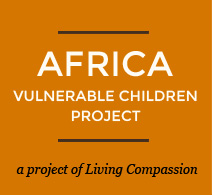Having no internet can put a very large monkey wrench in our carefully drawn plans!
We had only one item on our agenda for Saturday. We would meet Nelson, head of the People's Process on Housing and Poverty and Zambia Homeless and Poor People's Federation and take him to view the Living Compassion project in Kantolomba. He was to arrive at Castle Lodge at 11 a.m.
Friday night was an early one so we were up before light, ready to tackle email, go through pictures for the blog, write the blog, send the blog--all those tasks we hadn't been able to accomplish the day before because the internet was down. Still no internet. Well there's certainly plenty of time now for all those nurturing activities like meditation and yoga!
Soon Eunice was up and on the task of getting us all back online. Jen decided to take advantage of the extra time to make a run to the store for party supplies.
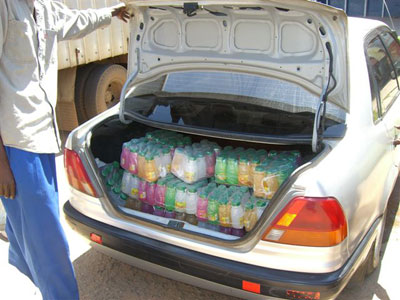
The party drinks loaded in the trunk.
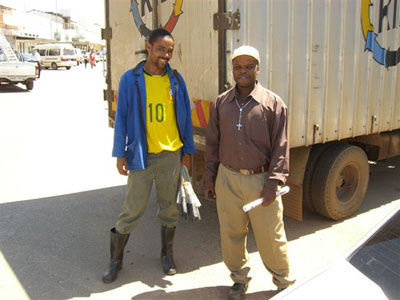
Jen ran into Douglass, an old friend from our days staying at St. Joseph's guesthouse. He reported that he and his family are all well. It was a pleasure to see him. We love feeling like locals when we run into friends.
About 10:30, while Cheri was happily sitting out under a huge shade tree, enjoying the greenery, fresh air, and cool temperatures, she was told there were three people waiting to see her in the reception area. Nelson had arrived along with two colleagues, Michael and Memory. Not wanting to exchange any information that would need to be repeated when Jen returned, the four used the time to solve all the world's problems. Blessedly, there was complete agreement about both content and process.
Later in Kantolomba, Nelson, Memory, and Michael explained to the Living Compassion team how organizing as a community could work for Kantolomba. Nelson explained the benefits of a community saving's plan, how the People's Process on Housing and Poverty and Zambia Homeless and Poor People's Federation could match the Kantolomba Cooperative's savings in loans for community improvement, and how Kantolomba could become a political force to require the local government to provide services the community is due.
The lack of enthusiasm was palpable! Nelson went on to say that the men will always be skeptical of these ideas. "The men," he said, "will have 'very good reasons' not to save money or get involved in community projects, but what they won't tell you is that they want the money for beer." The women smiled and nodded; the men did not.
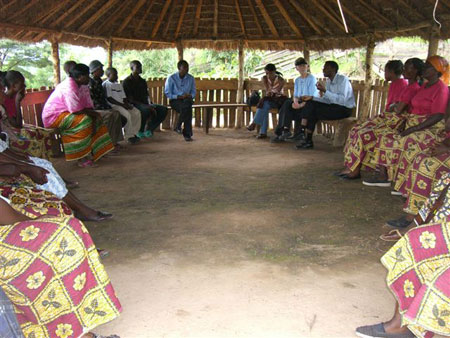
Meeting in the insaka
After several invitations to ask questions and make comments, a couple of the women spoke. They told us they were skeptical about this kind of thing because of bad situations in the past. Micro-finance organizations loaned money, and when the recipient couldn't pay the loan back on the exact schedule, the organization would come and take whatever the person had as repayment. They told us some people will charge 100% interest on a loan. Nelson seemed horrified and hastened to explain that the People's Process on Housing and Poverty and Zambia Homeless and Poor People's Federation understands the plight of poor people, knows how many simple life circumstances can destroy the small resources of the hardest working families. These are "soft loans," he explained. After six months the recipient will begin to repay the loan. They will be given plenty of time to establish their business and build some reserves.
The next hurdle was a lack of trust of other people in the community. The women trust themselves and one another but have had enough negative experiences with other people in Kantolomba that they're hesitant to start including a wider circle. We encouraged them to consider beginning as their own group--saving money together and opening a bank account--and then hand-picking new people to join them, a few at a time. This seemed to be well received. (It is a compelling projection exercise to watch a group of people discuss something like this in a language one doesn't understand. What does that body language suggest? What does that facial expression mean? Are they afraid, opposed, not interested? What?)
After our meeting Nelson and his team took us out to see one of their projects in a town just beyond Kitwe. Kitwe is a small city about 40 minutes west of Ndola. It is one of Zambia's primary business and industrial centers. Many of the mining operations are headquartered in Kitwe, and, as a result, the area suffers all of the ill effects of mining, in particular pollution and general environmental degradation.
Their project was a pleasure to see. They have provided loans to 145 people who are now part of a cooperative building their own homes. Those 145 people (in theory) report to the construction site each day to help build the houses. It started with a period of training where everyone learned the skills needed: brick making, bricklaying, door and window installation, roofing, etc. It was fun to see the people themselves building their homes. We were impressed with the intelligent, down-to-earth methodologies of organization and look forward to continuing a relationship with them.
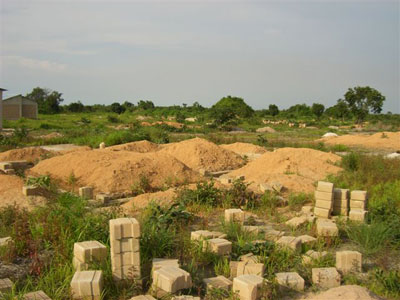
The site of the project.
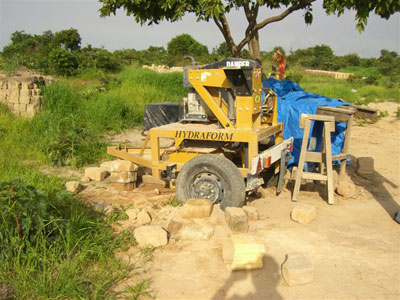
The machine used to make the Hydraform bricks.
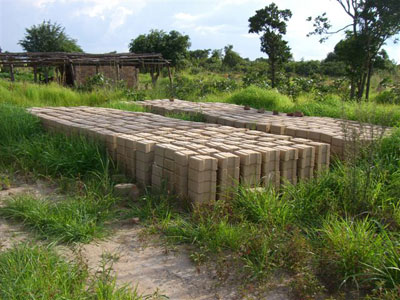
They say when 15 of them are working, they can make about 1,000 bricks per day.
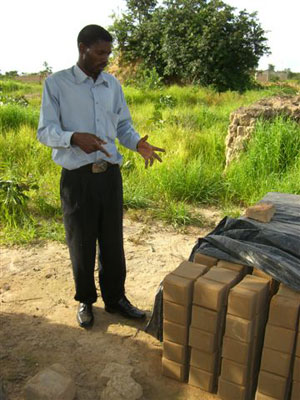
Nelson explains the process of curing the bricks for two weeks.
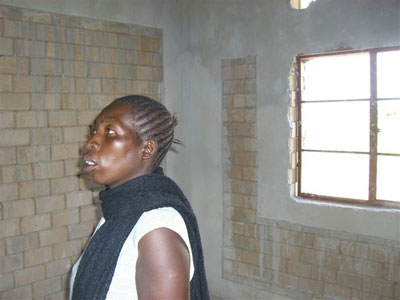
Georgina, one of the project participants and future resident, shows us the inside of one of the houses.
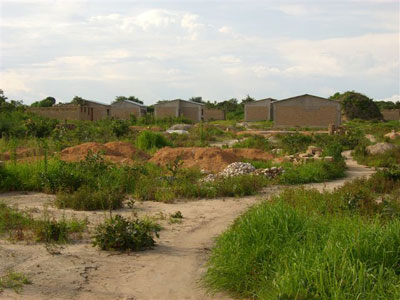
A view of several of the nearly completed homes.
We returned home for a delightful dinner with Godfrey, our local computer whiz kid. He's one year away from college graduation, has started his own IT business, and is taking a job at the electric company to get some corporate experience under his belt. We suspect Godfrey is the Bill Gates/Steve Jobs of Zambia!
As we ate our lasagna the skies opened up and delivered our first storm of the "wet season." Rain drops the size of marbles; thunder and lightening that could have been alarming had the air not been so warm and the breeze so refreshing.
